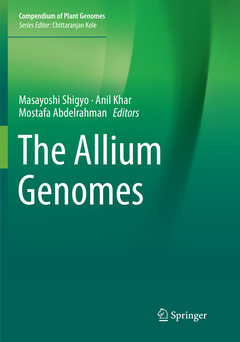Description
The Allium Genomes, 1st ed. 2018
Compendium of Plant Genomes Series
Coordinators: Shigyo Masayoshi, Khar Anil, Abdelrahman Mostafa
Language: English
Subjects for The Allium Genomes:
Publication date: 12-2018
Support: Print on demand
Publication date: 10-2018
Support: Print on demand
Description
/li>Contents
/li>Comment
/li>
This book describes the latest advances in Allium genome research. Allium includes plant species known for their huge nuclear genome size, which makes them ideal for somatic chromosome observations in high school experiments.
In order to advance the genome analysis of A. cepa and its functional study, scientists in international research collaborations have developed several types of artificially manipulated genetic stocks and analyzed them using modern technologies.
The Allium vegetable crop includes garlic, shallot, wakegi onion, Japanese bunching onion, and rakkyo. Bulb onion is one of the world's most important Allium commercial crops, with an estimated annual production of 85.8 million tons in 2013, and ranking third after tomato and watermelon in terms of global vegetable crops.
Covers the latest findings in Allium genome sequencing and genomics research
Is of interest to scientists in plant genetic research and vegetable breeding
Demonstrates how scientific findings from plant genomics can be used to improve plant breeding




